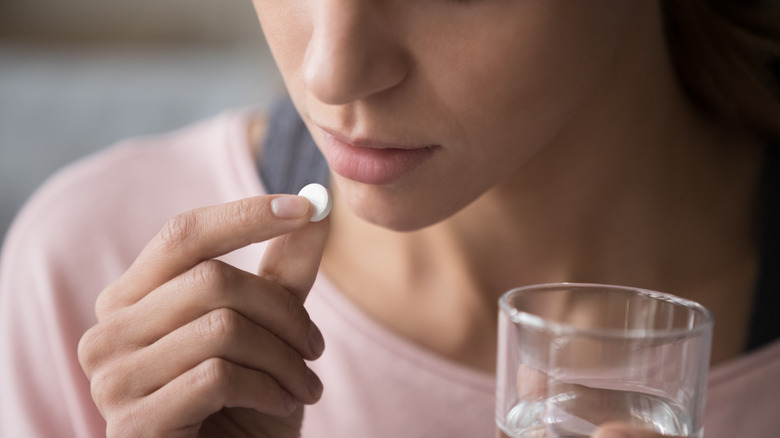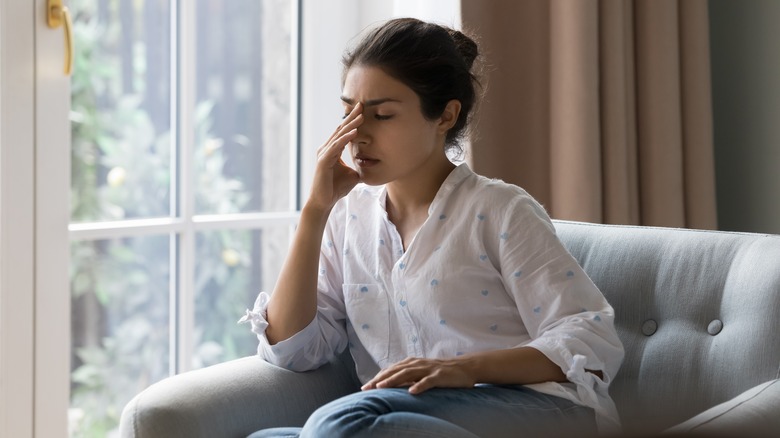Is It Safe To Drink Coffee While Taking Tylenol?
Whether you're a die-hard coffee connoisseur or you simply enjoy a cup in the morning, there's no denying that this warm, comforting liquid is an integral part of many people's lives. According to 2023 survey data published by the National Coffee Association (NCA), over 65% of adults drink coffee daily, with the average person consuming around three cups per day. While coffee may seem like a simple and harmless drink, it's important to note that it may interact with certain medications, like Tylenol.
Tylenol is a brand name for a popular over-the-counter pain reliever and fever reducer medication, also known by its generic name, acetaminophen, according to Healthline. It is widely used to treat mild to moderate pain, such as headaches, backaches, menstrual cramps, and fever, and is available in various forms, including tablets, capsules, chewable tablets, liquid, and granules. Tylenol works by blocking the production of prostaglandins, chemicals in the body that cause pain, per Tufts University. However, unlike nonsteroidal anti-inflammatory drugs (NSAIDs), such as ibuprofen and aspirin, Tylenol does not have anti-inflammatory properties.
The safety of drinking coffee while taking Tylenol (acetaminophen) has been a topic of debate in the medical community for many years. While there is no clear consensus, some studies have examined the potential risks of combining these two substances.
Mixing coffee with Tylenol
Coffee has many health benefits — the British Liver Trust even says that moderate amounts may help reduce the risk of liver disease. However, when combined with Tylenol, these beneficial effects are lost. According to a 2017 study published in the Journal of Drug Delivery and Therapeutics, one serious side effect of Tylenol is liver damage. This can occur if you take Tylenol for an extended period or if you take more than the recommended dose. The study adds that excessive coffee intake while using Tylenol correlates with an increase in damage to the liver, kidneys, and gastrointestinal system.
While there may be some potential risks associated with combining caffeine and Tylenol, a 2007 randomized controlled trial published in the journal Current Medical Research and Opinion found that safe amounts of both substances did not significantly impact the body. The researchers concluded that moderate coffee consumption is unlikely to affect the safety or efficacy of Tylenol. However, they did mention that caffeine enhances the efficacy of Tylenol.
In general, it may be best to follow proper dosage guidelines for caffeine and Tylenol and avoid excessive use of either substance — this is especially important if you have liver disease or other underlying health conditions. The recommended daily caffeine intake limit is about 400 mg daily for most adults, equivalent to about 4 cups of coffee, says the Mayo Clinic. For Tylenol, the maximum recommended daily dose is 4,000 milligrams (mg) for adults, and it is important not to exceed this amount (per Harvard Health Publishing).
Side effects of Tylenol
Overall, Tylenol is a widely used and effective pain reliever and fever reducer that is available without a prescription. However, it is important to use it responsibly and to talk to a doctor if you have any concerns about taking Tylenol, whether with coffee or alone. They can help you determine the appropriate dosage and timing for both substances based on your health needs and medical history.
While Tylenol is generally considered safe when taken as directed, it can be harmful when taken in excessive amounts. Taking more than the recommended dose can lead to stomach pain, nausea, and vomiting, per MedlinePlus. Ironically, Tylenol can sometimes cause headaches as a side effect. According to the Mayo Clinic, this is known as medication overuse or rebound headaches — you can experience this if you take certain medications like Tylenol for an extended period. Other potential side effects of Tylenol include dizziness and tiredness, and in rare cases, it can also cause low blood sugar, as explained by DrugWatch. Some people may also experience allergic reactions to Tylenol, including rash, hives, difficulty breathing, itching, or facial or mouth swelling. If you experience any of these symptoms, seek medical attention immediately.
In addition, Tylenol can interact with certain medications, including blood thinners, according to Harvard Health Publishing. For this reason, it's always best to speak to your doctor before combining medications.



